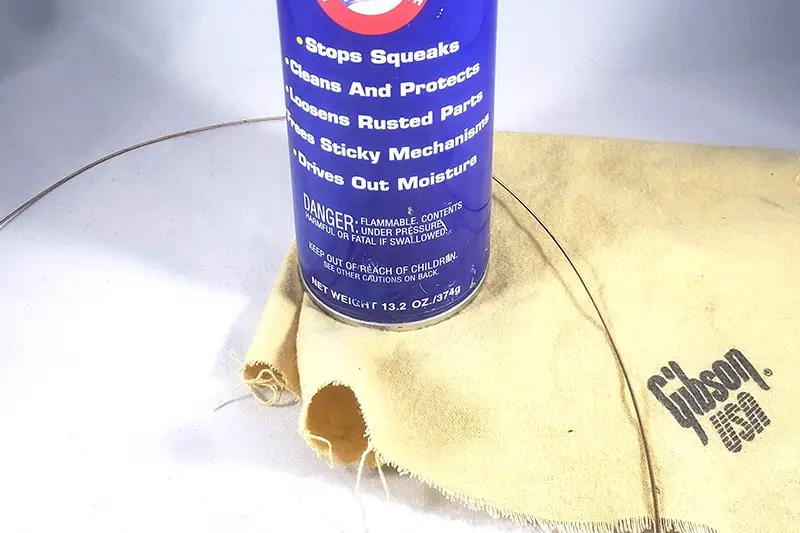Guitar strings need to be cleaned if you hope to maintain their tone and performance and if you want to get your money’s worth from a new set. Proper cleaning and maintenance of guitar strings can double or triple their life expectancy. But what can you use to clean them?
There are a small number of household items that you can use to clean your guitar strings including boiling water, water with dish soap, isopropyl alcohol, and Windex. However, most household cleaners contain ammonia, alcohol, and/or abrasives and should not be used to clean guitar strings.
What household items should I use to clean my guitar strings?
I recommend quickly wiping strings down with a dry cloth every time before and after playing keeps strings clean and corrosion free. Check out our article on The Best Way To Clean Guitar Strings: An Easy To Follow Guide. I keep a microfiber cloth on my guitar stand and give the strings a quick once over when I pick the guitar up and before I put it away. I play daily and using this method I find that I need to change my strings about three times a year. I live in a very arid climate, so your results are going to vary based on many factors, humidity being only one (but a critical one).
One can technically use household cleaners to clean strings. I find that proper string maintenance makes using cleaners unnecessary. But if you find yourself with really dirty strings you can press a few household items into service. Most carry a significant downside if not used cautiously.
Household items that can be used (if you really, really need to).
- Boiling water
- Water + dish soap
- Isopropyl alcohol
- Windex
As previously stated, most household cleaners contain ammonia, alcohol or abrasives. I highly recommend removing the strings if you use any products with ammonia or alcohol so as not to damage the fretboard or finish. I do not recommend using anything with an abrasive as the fine particles of grit will remain in the string windings and can also damage your finish.
Using boiling water to clean guitar strings
 Warning – Boiling water is very hot, take proper precautions to prevent burns (Yes, it needs to be stated)
Warning – Boiling water is very hot, take proper precautions to prevent burns (Yes, it needs to be stated)
- Remove strings from your guitar and coil them up
- Boil water in a small saucepan
- With tongs, gently place coiled strings in the boiling water for 3-5 minutes
- Remove from heat and then remove the strings from the pan with tongs or a strainer
- Place them on a towel and get them as dry as you possibly can
This is an old trade trick bass players have made nearly fundamental. Bass strings are significantly more expensive and bass players have used their vast reserves of ingenuity to get as much life out of their strings as possible. This is the best method to try and restore a really grody set of strings. It’s essentially free and there is little chance of damaging your finish or fretboard if done properly. You don’t want to leave water on the strings because they are metal and if you learned anything in high school chemistry, it’s that metal rusts when exposed to water.
Using water with dish soap to clean guitar strings
- Mix one cup of warm water with one drop of dish soap
- Dip a cloth in the mixture and wring as much water out of the cloth as possible
- Wipe each strings several times
- With a different clean cloth, dip in straight warm water (no soap), wring out as much water as possible, and repeat to remove any soap residue
- With a third clean dry cloth, dry the string extensively (and fretboard if you did not remove the strings)
You don’t want to leave any soapy residue on your strings as it will only negate the benefits of cleaning them. And to repeat, do not leave any water on the strings or fretboard.
Using with Isopropyl Alcohol or Windex to clean guitar strings
- Wet a small section of your rag or a cotton ball with isopropyl alcohol/Windex
- Using the wetted area, wipe down each string several times
- Repeat until wiping no longer leaves residue on the cloth or cotton ball
- Wipe each string with a separate clean, dry cloth to mop up any excess isopropyl alcohol/Windex
Isopropyl alcohol and ammonia will damage and stain your fretboard and finish. It is a best practice to remove the strings before cleaning with isopropyl alcohol or Windex. Also, ISOPROPYL ALCOHOL IS EXTREMELY FLAMMABLE! Use only in a well ventilated area and away from open flame.
Straightforwardly, these cleaners should only be used if a proper cleaning routine has not been maintained. Daily cleaning with any type of dust cloth will do. Your best bets are cloths that are lint free, such as a microfiber cloth. But any clean, old cloth will do the job of cleaning moisture and dirt off your strings.
Daily guitar string cleaning
I recommend one of the following washed household items to use for basic daily guitar string cleaning:
- A small section of old cotton or flannel shirt or sheets
- Dish cloth
- Widowed sock whose mate was lost in the dryer
Can you use WD-40 to clean guitar strings?
 The short answer is “yes” – you can use WD-40 to clean your guitar strings. As Jeff Goldblume concisely put it, “Your scientists were so preoccupied with whether or not they could, they didn’t stop to think if they should.” That in mind, perhaps a better question is “Should you use WD-40 to clean guitar strings?”
The short answer is “yes” – you can use WD-40 to clean your guitar strings. As Jeff Goldblume concisely put it, “Your scientists were so preoccupied with whether or not they could, they didn’t stop to think if they should.” That in mind, perhaps a better question is “Should you use WD-40 to clean guitar strings?”
WD-40 is pretty magical stuff and is a great product with myriad uses. It’s one of two items (the other being duct tape) that should be in every household. It works as a cleaner, a protectant, a lubricant and it’s fairly inexpensive. All characteristics one might look for in a quality guitar string cleaner. However… there are a lot of things to consider before you go slathering it on your strings.
First, you can find many people on both sides of the WD-40 argument. Lots of listicles for “brilliant” uses for WD-40 include it as a guitar string cleaner. I take those with a grain of salt because the authors are not likely avid guitarists or one of the fine chemical engineers at WD-40 Company. Some of those same lists recommend using it to clean dog crap out of your boots by spraying WD-40 on the mess then scrubbing it off with an old toothbrush. I assume this same idea exists on someone’s listicle for 18 Brilliant Uses for an Old Toothbrush. But I digress.
Go to any guitarist forum and you’ll find cautionary tales about using WD-40 to clean strings interspersed with plenty of shock that someone even came up with the idea.
In short, bloggers generally recommend it, guitarists generally do not.
2nd, WD-40 is odoriferous. And like the smell of horse sweat and patchouli, some people (me included) have a closeted appreciation for those aromas. But just because I appreciate those smells doesn’t mean I have any desire to smell like them. And that is exactly what will happen. You put WD-40 on the strings then start playing and it gets on your fingers. You then wipe your hands on your shirt or pants, touch your face and your hair. Inevitably you and those in close proximity will be smelling it long after you’ve put your guitar down.
3rd, WD-40 stains. It is a petroleum product, not entirely different from wax or petroleum jelly. It stains clothes and most importantly it stains wood. If it gets on your fretboard it will discolor the wood and the only way to fix it is to sand it out or treat the whole fretboard. Treating the whole fretboard of course leaves you with more of problem #2.
Now let’s talk about the magical properties. WD stands for “Water Displacing” and WD-40 displaces water better than just about any other product. It will impede sweat, oil, spit, snot and whatever else you might have on your hands from penetrating the windings of your stings. These water displacing properties will also prevent your strings from corroding. And finally, WD-40 is most famous for being a lubricant, which will help keep your fingers from screeching and will lower the friction allowing for quieter, smoother, and faster playing.
Bottom line, as a musician and a luthier, I do not recommend using WD-40 on your strings. My opinion is that the negatives do not outweigh the positives. Further, the positives can all be achieved with other products that don’t carry all the negatives, eg. products designed for cleaning guitar strings and coated or treated strings.
There are a few everyday household cleaners that will do the job of removing debris and gack from a grungy set of guitar strings. A proper cleaning routine with a dry cloth before and after playing should eliminate any need for heavier cleaning. There is no downside to quickly wiping down your strings every time you play your guitar. It’s free and it saves you money by extending string life. But there are many potential downsides to using common household items to clean strings.



